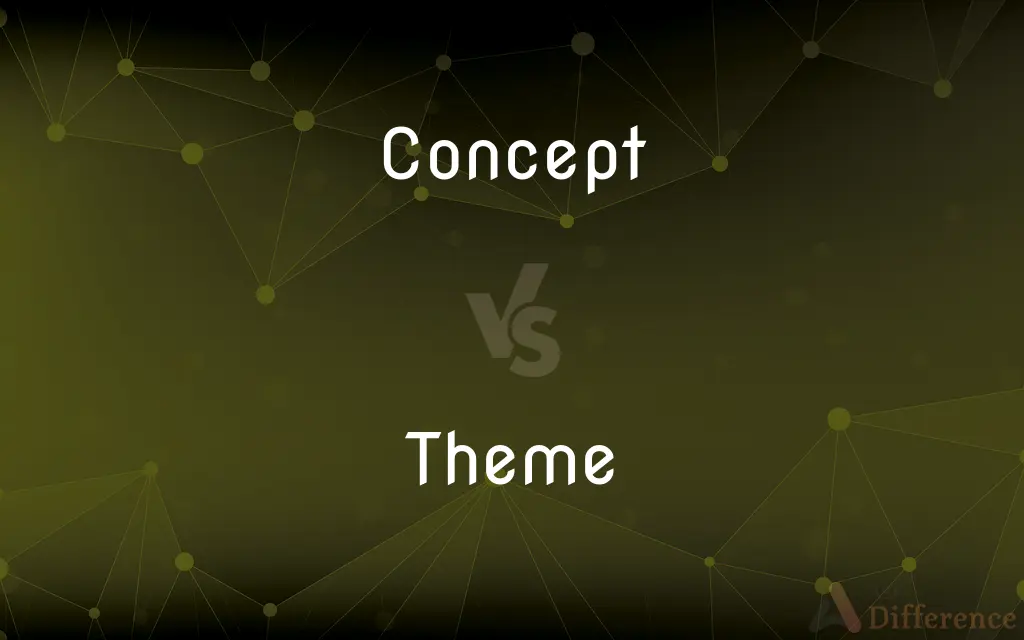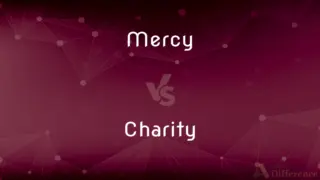Concept vs. Theme — What's the Difference?
By Urooj Arif & Maham Liaqat — Updated on March 14, 2024
A concept is a general idea or understanding, often abstract, that forms the foundation of thoughts, whereas a theme is a central topic, subject, or message that runs through a narrative or artistic work.

Difference Between Concept and Theme
Table of Contents
ADVERTISEMENT
Key Differences
Concepts are foundational to the creation and interpretation of knowledge, serving as building blocks for theories, hypotheses, and understanding in various fields. Themes, on the other hand, are specific to narrative or artistic contexts, representing underlying messages or moral lessons that are intended to provoke thought or convey deeper meanings.
In education and learning, concepts are crucial for structuring content and facilitating understanding, providing a framework for students to grasp more complex ideas. Themes are often explored in literature, film, art, and music, where they add depth and richness to the work, allowing for multiple interpretations and discussions.
Concepts can be broad and universal, applicable across different disciplines and contexts, such as the concept of justice or freedom. Themes are more specific to the work in which they appear, such as the theme of love overcoming obstacles in a particular novel or the theme of environmental conservation in a documentary.
Understanding concepts is essential for cognitive development and problem-solving, as they help individuals categorize and make sense of information. Identifying themes requires analytical skills and critical thinking, as it involves interpreting and finding connections within a work to uncover deeper meanings.
Comparison Chart
Definition
A general idea or understanding that forms the basis of thoughts.
A central topic, subject, or message in a narrative or artistic work.
ADVERTISEMENT
Context
Broad, applicable in various fields and disciplines.
Specific to narrative or artistic contexts, such as literature, film, and art.
Purpose
To provide a foundational framework for knowledge and understanding.
To convey deeper meanings, messages, or moral lessons within a work.
Nature
Often abstract and universal.
Specific and central to the work in which it appears.
Role in Learning
Crucial for structuring content and facilitating comprehension.
Explored to add depth, provoke thought, and enhance interpretation.
Compare with Definitions
Concept
An abstract idea representing the fundamental characteristics of what it represents.
The concept of freedom is central to many political ideologies.
Theme
The underlying message or main idea in a narrative or artistic work.
The theme of betrayal runs deep in Shakespeare's play Macbeth.
Concept
A mental representation used to categorize and interpret information.
The concept of gravity helps explain why objects fall towards the Earth.
Theme
A recurring subject or idea that is explored through the narrative.
The theme of resilience in the face of adversity is common in many heroic tales.
Concept
Can be theoretical, forming the basis of hypotheses and theories.
The concept of evolution underpins much of modern biology.
Theme
Can provide insights into human nature and societal issues.
Orwell's 1984 explores themes of surveillance, power, and freedom.
Concept
Can be applied universally, across various contexts and disciplines.
The concept of symmetry is found in mathematics, physics, and art.
Theme
Enhances the depth and richness of literature, film, and other forms of art.
The theme of environmentalism is prevalent in the documentary An Inconvenient Truth.
Concept
Fundamental to cognitive processes, such as reasoning and problem-solving.
Understanding the concept of conservation is crucial in early cognitive development.
Theme
Invites interpretation and analysis, leading to various understandings.
The theme of love in Romeo and Juliet can be interpreted in multiple ways.
Concept
Concepts are defined as abstract ideas or general notions that occur in the mind, in speech, or in thought. They are understood to be the fundamental building blocks of thoughts and beliefs.
Theme
A topic of discourse or discussion.
Concept
An abstract idea
Structuralism is a difficult concept
The concept of justice
Theme
A subject of artistic representation.
Concept
A general idea or understanding of something
The concept of inertia.
The concept of free will.
Theme
An implicit or recurrent idea; a motif
A party with a tropical island theme.
Concept
A plan or original idea
The original concept was for a building with 12 floors.
Theme
A short composition assigned to a student as a writing exercise.
Concept
A unifying idea or theme, especially for a product or service
A new restaurant concept.
Theme
(Music) A recurring melodic element in a composition, especially a melody forming the basis of a set of variations.
Concept
Having an experimental or strikingly different design, especially to test or demonstrate new features
A concept car.
Theme
See topic.
Concept
An abstract and general idea; an abstraction.
Theme
A stem.
Concept
Understanding retained in the mind, from experience, reasoning and imagination; a generalization (generic, basic form), or abstraction (mental impression), of a particular set of instances or occurrences (specific, though different, recorded manifestations of the concept).
Theme
A subject, now especially of a talk or an artistic piece; a topic.
Concept
(generic programming) A description of supported operations on a type, including their syntax and semantics.
Theme
A recurring idea; a motif.
Concept
To conceive; to dream up
Theme
A concept with multiple instantiations.
Variations on the theme of entrepreneurial resourcefulness
Concept
An abstract general conception; a notion; a universal.
The words conception, concept, notion, should be limited to the thought of what can not be represented in the imagination; as, the thought suggested by a general term.
Theme
Any of various colors, or color palettes, in which a design is offered; (GUI) any of various skins for an app, affecting the visuals and perhaps other elements such as sound effects.
Switch to a dark theme to conserve battery power
Concept
An abstract or general idea inferred or derived from specific instances
Theme
(dated) An essay written for school.
Theme
(music) The main melody of a piece of music, especially one that is the source of variations.
Theme
A song, or a snippet of a song, that identifies a film, a TV program, a character, etc. by playing at the appropriate time.
Theme
(grammar) The stem of a word.
Theme
(linguistics) thematic relation of a noun phrase to a verb.
Theme
(linguistics) Theta role in generative grammar and government and binding theory.
Theme
(linguistics) Topic, what is generally being talked about, as opposed to rheme.
Theme
A regional unit of organisation in the Byzantine empire.
Theme
(transitive) To give a theme to.
We themed the birthday party around superheroes.
Theme
To apply a theme to; to change the visual appearance and/or layout of (software).
Theme
A subject or topic on which a person writes or speaks; a proposition for discussion or argument; a text.
My theme is alway one and ever was.
And when a soldier was the theme, my nameWas not far off.
Theme
Discourse on a certain subject.
Then ran repentance and rehearsed his theme.
It was the subject of my theme.
Theme
A composition or essay required of a pupil.
Theme
A noun or verb, not modified by inflections; also, that part of a noun or verb which remains unchanged (except by euphonic variations) in declension or conjugation; stem.
Theme
That by means of which a thing is done; means; instrument.
Theme
The leading subject of a composition or a movement.
Theme
The subject matter of a conversation or discussion;
He didn't want to discuss that subject
It was a very sensitive topic
His letters were always on the theme of love
Theme
A unifying idea that is a recurrent element in a literary or artistic work;
It was the usual `boy gets girl' theme
Theme
(music) melodic subject of a musical composition;
The theme is announced in the first measures
The accompanist picked up the idea and elaborated it
Theme
An essay (especially one written as an assignment);
He got an A on his composition
Theme
(linguistics) the form of a word after all affixes are removed;
Thematic vowels are part of the stem
Theme
Provide with a particular theme or motive;
The restaurant often themes its menus
Common Curiosities
Can a theme become a concept if it is universally applicable?
While themes can touch on universal ideas, they remain specific to the works in which they appear; concepts are broader and more foundational in nature.
Can a single narrative have multiple themes?
Yes, narratives often explore multiple themes, each adding layers of meaning and richness to the work, and allowing for diverse interpretations.
How do themes contribute to the cultural significance of a work?
Themes contribute to the cultural significance of a work by reflecting, challenging, or commenting on societal values, norms, and issues, often sparking discussion and reflection.
How does one identify a theme in a narrative?
Identifying a theme involves analyzing the narrative for recurring subjects, messages, or moral lessons that are woven through the work, often requiring critical thinking.
How do concepts differ from themes in their application?
Concepts provide a foundational framework for understanding across various disciplines, while themes convey deeper meanings within specific narrative or artistic works.
Are concepts always abstract?
Many concepts are abstract, representing general ideas or categories, but some can be more concrete, especially in scientific and technical fields.
Can themes influence the way a narrative is perceived?
Yes, themes can significantly influence the perception of a narrative, shaping the audience's understanding, emotional response, and the moral or philosophical questions they consider.
How are concepts used in problem-solving?
Concepts are used in problem-solving by providing a mental framework that helps individuals categorize information, identify patterns, and apply known solutions to new problems.
Why is understanding concepts important in education?
Understanding concepts is crucial in education because it allows students to grasp complex ideas, build upon prior knowledge, and apply understanding across different contexts.
How can the exploration of themes enhance personal growth?
Exploring themes can enhance personal growth by encouraging empathy, broadening perspectives, and prompting individuals to reflect on their values, beliefs, and the human condition.
Share Your Discovery

Previous Comparison
Mercy vs. Charity
Next Comparison
Amaranth vs. QuinoaAuthor Spotlight
Written by
Urooj ArifUrooj is a skilled content writer at Ask Difference, known for her exceptional ability to simplify complex topics into engaging and informative content. With a passion for research and a flair for clear, concise writing, she consistently delivers articles that resonate with our diverse audience.
Co-written by
Maham Liaqat













































